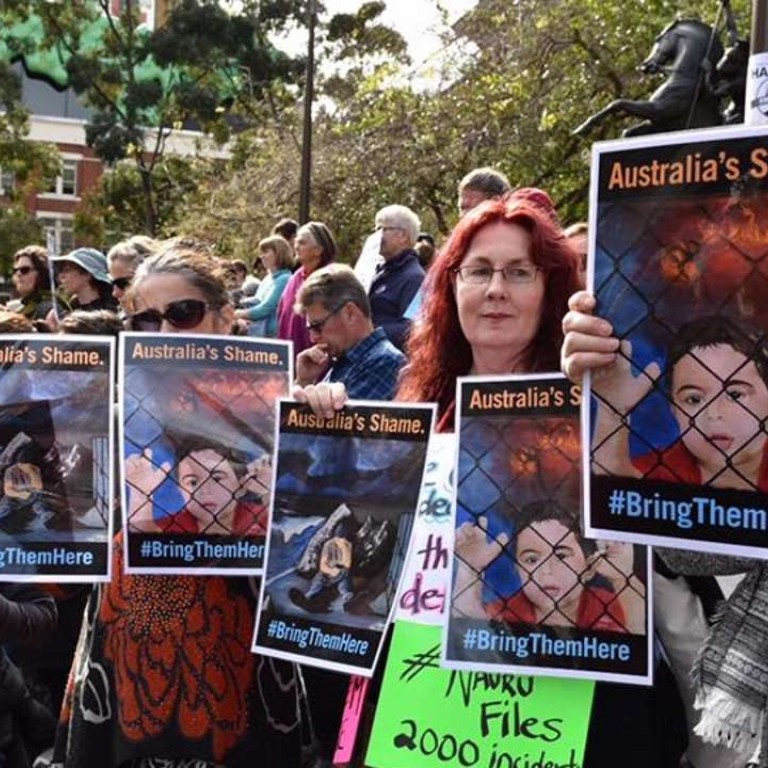
‘The madness is eating us alive’: inside Australia’s asylum camp on Nauru
After two years in what Amnesty International calls an ‘open air prison’, Iraqi artist Abbas Alaboudi is losing hope
Abbas Alaboudi has stopped painting as the pain of spending more than two years on Nauru has broken his spirit. He is one of the 755 refugees held indefinitely on the island that has become Australia’s offshore dumping ground in its deterrence of asylum seekers.
“There’s no life or future here,” Alaboudi told This Week in Asia from his room outside the detention centre where 442 of his fellow refugees are housed. “We are merely breathing so we don’t die on the sea.”
Amnesty claim refugees tortured and ‘driven to suicide’ at Nauru camp disputed by Australia

Australia criticised over ‘severe abuse, inhumane treatment’ of asylum seekers in Nauru

“When we see immigration minister Peter Dutton on television it distresses us. We are tired of waiting and we are going insane. The madness is eating us alive,” Alaboudi said.
The Iraqi asylum seeker, 27, left Baghdad in July 2013. He cites threats from terrorist groups as motivating the decision, but does not want to name them out of fear for his family’s safety.

He travelled to the United Arab Emirates then to Indonesia and from there boarded a small boat with his cousin, 42, after paying a smuggler who promised them safety in Australia more than A$15,000 (HK$89,000).
After four days in the ocean, severely dehydrated and unsure of their fate, they were intercepted by an Australian naval boat.

“The smuggler told me there would be no problems but I did not know that the migration policies had been toughened,” said Alaboudi.
Australia has spent around A$300 million on naval interception turning back boats carrying asylum seekers and about A$3.5 billion on offshore processing in the past four years.
“Australia has spent A$1.1 billion on the two camps in Nauru and Manus [Papua New Guinea] servicing just over 2,000 people. That money could be far better spent on improving conditions for the hundreds of thousands in transit countries” she said.
The human rights group, with Amnesty International, last month gathered testimonies of abuse from refugees on Nauru.
Pearson said Australia could contribute to resettlement costs in transit countries in Southeast Asia such as Indonesia and Cambodia, where refugees are not allowed to work and are subject to repeated harassment from authorities.
Cambodia says it will take no more refugees from Australia’s Nauru detention camp
Alaboudi was offered a similar choice, which he rebuffed. “Immigration officials told me repeatedly to go to Cambodia or to go back to Iraq. The overall message is that you’re not going to Australia and they do it to break your spirit”.

With the political turmoil in Syria and Iraq continuing, Australia agreed to accept 12,000 refugees from both countries to its humanitarian programme in September last year but Alaboudi is not eligible.
Demonstrators in Australia held paintings by Alaboudi in August this year during nationwide protests urging the government to end offshore detention of refugees.
“I want to live like any normal person,” said Alaboudi. “Life here is absurd and abnormal.”
“Australia’s experiment with offshore detention and resettlement shows it is extremely harmful to asylum seekers and refugees,” Pearson said.
Alaboudi is pessimistic about the chances of a policy change any time soon. He celebrated his twenty-seventh birthday surrounded by other refugees on the island last month.
“I am getting older by the day but my life is slipping away,” he said.
Farid Farid is an Australian journalist based between Cairo and Berlin. Follow him on Twitter: @FaridYFarid

